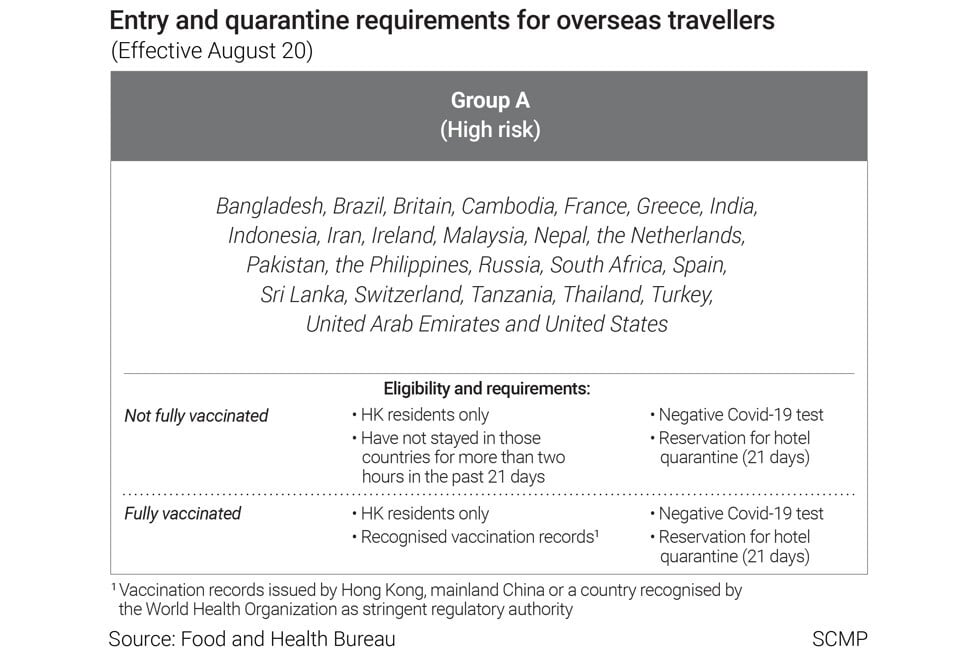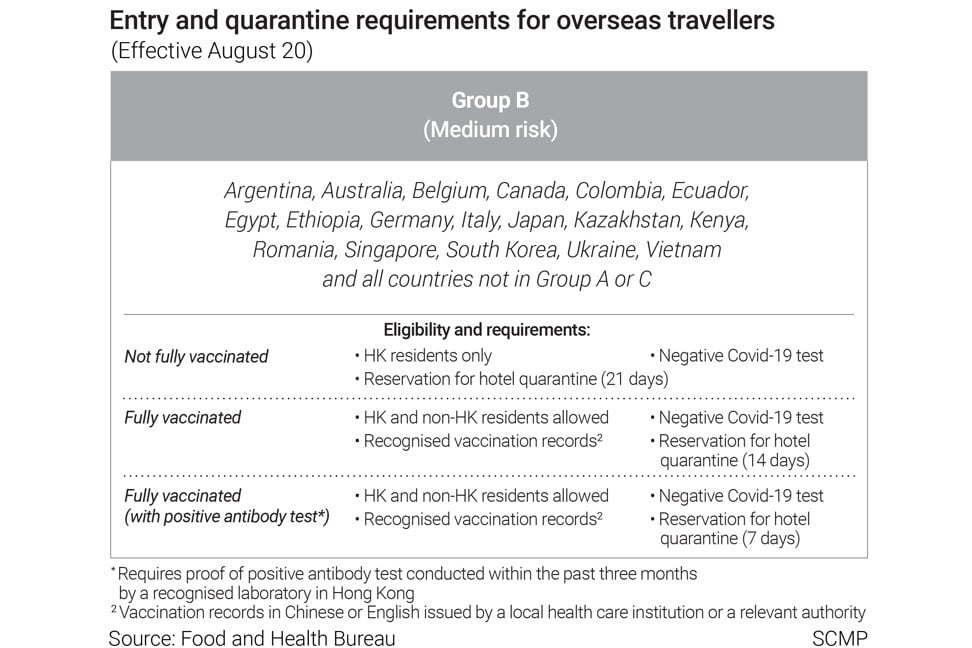
Coronavirus: Hong Kong tightens entry rules for arrivals from 16 countries battling Covid-19 resurgence, increasing quarantine to 21 days
- US, France, Thailand, United Arab Emirates and Malaysia among those reclassified as high risk for Covid-19, taking effect on Friday
- Officials also poised to increase quarantine requirement to 14 days, from current minimum of seven, for fully vaccinated arrivals from medium- and low-risk places
This story has been made freely available as a public service to our readers. Please consider supporting SCMP’s journalism by subscribing.
Travellers’ plans in disarray after Hong Kong revises Covid-19 entry rules
“After considering a basket of factors, the government has decided to upgrade the risk grouping of 16 overseas places to impose more stringent boarding, quarantine and testing requirements on relevant inbound travellers in order to uphold the local barrier against the importation of Covid-19,” a government spokesman said.
Adding further uncertainty to Hong Kong’s coronavirus situation, a 47-year-old woman, working in an airline lounge at the city’s airport, tested preliminary-positive for the L452R mutant strain in a case tentatively classified as local. The patient was not vaccinated and had no travel history.
Mei Yat House in Yat Tung (II) Estate in Tung Chung, where the airport worker lived, was put under overnight lockdown on Monday evening for Covid-19 testing.

The changes also followed China’s former health minister Gao Qiang saying this month that a strategy known as co-existing with the virus with minimal restrictions was not feasible.
In all, 15 countries will see their status changed from medium to high risk: the US, France, Malaysia, Thailand, the United Arab Emirates, Bangladesh, Cambodia, Greece, Iran, the Netherlands, Spain, Sri Lanka, Switzerland, Tanzania and Turkey. Australia will be vaulted from low to medium risk.

The daily number of new infections in the US topped 140,000 on Friday after averaging in the five digits over the past month.
Twenty imported cases confirmed in Hong Kong over the past four weeks had recently been to the US, making it the top exporter of infections to the city in that period.
The stricter system means travellers from the 15 new high-risk nations must be fully vaccinated for at least 14 days before boarding a flight to Hong Kong, then undergo 21 days of quarantine in a designated hotel upon arrival, with four tests during isolation and another one on the 26th day after landing in the city.
Health authorities warn local labs not to accept antibody test samples from overseas
For those arriving from high-risk places, officials will only recognise vaccination records issued by Hong Kong, mainland China and jurisdictions with a regulatory authority designated as stringent by the World Health Organization. Those recognised countries include Britain, Ireland, the US and France.
Unvaccinated travellers from Australia will now need to quarantine for 21 days – up from the current 14 – while fully jabbed arrivals will see their isolation extended from seven to 14 days, though the former figure still applies to those who also can produce a positive antibody test.
The countries already in the high-risk category are: Brazil, India, Indonesia, Ireland, Nepal, Pakistan, the Philippines, Russia, South Africa and Britain.
Under the scientific committees’ recommendations, arrivals from medium- and low-risk countries who are fully vaccinated and provide proof of having antibodies would need to undergo hotel quarantine for 14 days – from the current minimum period of a week – plus seven days of self-monitoring. They must also test negative for the virus on arrival and submit more regularly for screening.
Currently, travellers from the two groups fulfilling those conditions are subject to seven days in quarantine, but a positive antibody test is not needed for those in the low-risk category.

Citing local data, Professor David Hui Shu-cheong, chairman of one of the CHP committees, said 88.5 per cent of Covid-19 cases imported between April and Sunday, where the patients involved were fully vaccinated, were detected on their seventh day in the city.
“It appears there is a need to review the quarantine period. If we only rely on the first seven days of hotel quarantine, we will miss around 12 per cent [of cases],” Hui told a press conference on Monday.
China’s local Covid-19 transmission eases, eclipsed by imported cases
Dr Ronald Lam Man-kin, controller of the CHP, said the government would decide later when to implement the measures.
“After receiving the recommendation from the scientific committees, we will launch the measures as soon as possible,” Lam said. “But we would also need to discuss with the hotel industry.”
Also on Monday, Hong Kong confirmed three new Covid-19 cases: an arrival from Switzerland, a sea crew member from Malaysia and a fully vaccinated traveller from Japan.
The imported cases – all of which carried the L452R mutation, which is linked to a few coronavirus variants including the Delta version – took the city’s tally of confirmed infections to 12,036, with 212 related deaths. Fewer than five people tested preliminary-positive.
The case of the helper returning from the US has also prompted a clarification of antibody testing procedures, with the government urging Hong Kong labs not to accept antibody samples sent from overseas.
Coronavirus: number of children hospitalised with Covid-19 in US hits record high
Alex Li Wai-chun, chairman of the Hong Kong Association of Medical Laboratories, said he understood the helper’s samples were sent to the city from a US clinic in a practice he said was not uncommon and possible with suitable packing and transport.
But Li said he believed Hong Kong’s tightening of the rules could “reduce people’s worries” over the integrity of the samples, as the city had no jurisdiction over medical practices in other parts of the world.
Lam, from the CHP, said officials were still investigating whether there were any rule violations in the helper’s case.
Additional reporting by Victor Ting and Zoe Low

